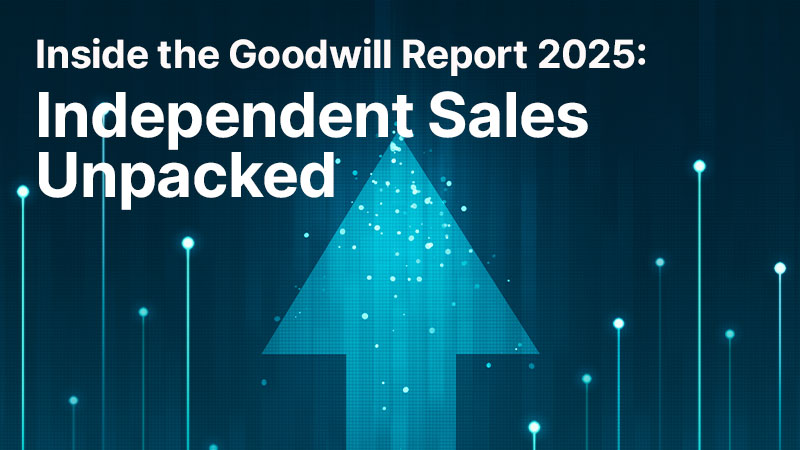Welcome to the latest edition of our Water Cooler series.
Um, it's that time of year again where we've now released our Goodwill report reporting all
of the transactions that took place that the Dental Eli acted on,
um, in the last 12 months, in the last fiscal year.
Um, and the data is quite interesting as ever. So Phil,
what was your sort of takeaways? Um, I guess,
look, in 2023, 2024, interest rates were rising, there was a lot of uncertainty in the market.
So I think, first of all, I think the market was a lot more sure,
um, in 2024, 2025.
You know, people realised, independents realised where interest rates were.
Um, you know, in the long term view is they will start to come down,
so that's fueled the market from an independent perspective.
Um, and likewise from a group perspective, what we're starting to see is the emergence of
microconsolidators. So the report does largely focus on the
benefits of potential sales to micro consolidators and independents as corporate
activity starts to slow down somewhat. Yeah, I mean,
I think, yeah, I mean the report is split into two sections,
so it talks about sales to independence, but as Bill alluded to it also sells.
To groups, um, and I guess there's a few sort of interesting takeaways from my side in the
sales to groups section.
And the first, as you alluded to, is that tier 4 consolidators,
now we class them as people who've bought anywhere between 3,
or who have anywhere between 3 and 10 practises in their estate.
They paid the highest average multiple in the in the last fiscal year beyond what the tier
ones and the tier 2s were doing.
Now the tier ones are the sort of the big boys, tier 2s are anyone sort of north of 20
practises. Now I guess what's interesting is.
That is more for the average sale value. Now I don't always tend to read much into
average sale value because it all depends on the deals we act on in the year.
But I think what is quite noticeable is the average sale values for tier one and tier two
transactions were both over 3 million pounds.
And I think anecdotally, I don't know if you'd agree, I think that's probably representative
of how the bigger groups have moved away from buying a lot of smaller stock,
which is what they did when we sort of had the land grab of sort of 34 years ago,
is now it has to be big and it has to be attractive.
For them to go for it. Yeah, well, speaking to,
to all of the bigger groups is they're kind of risk adverse at this moment of time.
So, normally with bigger sites, you know, the sites itself circa 3 million,
is you have revenue delivered by multiple clinicians, a hygiene service.
So from their perspective, it's a well managed and less risky business than potentially a
smaller practise in which the majority of income is derived by let's say a principal
dentist. So undoubtedly the groups are looking at
acquiring, Bigger practises, high levels of EI data which they can integrate and maybe have
less area managers than actually having, you know, buying 10 sites with 200k bit data which
they deem risky businesses. Yeah, and they went ahead to that recruitment
risk as well, I mean, cos there's still the recruitment challenges out there,
albeit I would say they're probably, you know, less so than there was sort of a year to 18
months ago. And I think that's represented when you look at
some of the regional data for the groups cos there's not actually that much disparity um
when you apply numbers between what I sell. A practise elsewhere in the north west,
conversely to what it sells for in London and the Southeast.
But if you go out to the real regions, so sort of the northeast,
um, or the Southwest Peninsula, that's where you do see an average multiple drop of probably
a good half a turn. Um, and I think that's represented that they
just, it's two things. First of all,
recruitment risk, and secondly, there just isn't the volume of consolidators in those
areas. Competition. So, so, you know, in them areas there's less
competition from groups.
Slightly you then start to get the tier 4. Consolidators, um,
and 11 point on tier 4s, and what this report really doesn't break down is although we touch
on multiples, we don't touch on deal structure.
Um, and certainly, you know, if anybody's out there is looking to market their business,
um, you know, going to the whole market and attracting tier 4,
interest, you may get a better multiple, but equally, you know,
the terms may be considerably better than if you went for a tier 1 or a tier 2.
Um, so the report doesn't really go into independent deal structures.
Yeah, and I guess that's the thing, isn't it, is that often with a group,
if you're selling, you're getting 70% upfront, and often there's the 3 year tie in.
On a typical average, obviously deals do vary. Um, but I guess if someone's gonna pay you 1000
less but let you walk away with all the money at the point of completion,
you can invest that and probably earn a lot of that back.
Um, and secondly, I guess is once you've sold, it kind of takes that stressful headache and
that might be a purpose for sale anyway.
Yeah, and there's, and there has been a noticeable change in groups actually looking at
deferred elements and being slightly more flexible than probably what they were 6 to 12
months ago, and I think that's a slight change into the market where groups are acknowledging
the tier 4 buyers and how competitive they are and they're almost having to,
to look at ways to make their offer slightly more attractive,
cos equally, you know, they want to. Required, so there's,
there's a lot of diversification in the market.
Um, and just one final point I wanted to pick up on with regard to groups,
um, is that you'll notice in the survey that there isn't,
um, an average for NHS practises sold to tier one consolidators.
Now the easy takeaway from that is to say that the biggest groups aren't acquiring
predominantly NHS practises, but that wouldn't be correct.
I think what probably is the takeaway, um, is that if you've got a bigger practise.
28 to 30,000 UDAs now is it's really, really rare to find that practise that is still
exclusively the NHS. Most people who've got that size of practise
have moved their business model towards a more mixed income business model.
So those groups who you would perceive are predominantly NHS are acquiring,
but they're acquiring mixed practises because to acquire at the level of EBIT data that they
want to acquire, those businesses are now mixed, they're not exclusive to the NHS anymore.
Yeah, and just to clarify, in terms of mixed, anything on an 80/20 ratio is considered a
mixed practise, so.
Um, you know, that, like you said, most bigger practises have diversified cos they realise
actually to maintain their EID or to grow their EBITDA, they need private income.
They can't just rely on NHS income which goes up by,
let's say 4.64% and already it's been muted this week that the NHS um contracts may only
rise by 3% this year, um, and that will have an impact in terms of NHS profitability.
For small, medium, and large NHS sites, um, to deliver the same data,
especially with national minimum wage increase, yeah, so yeah,
so the headline national average, um, for sales to groups in terms of the multiple EBD was
7.16%, um, but within that there are deals that are sold at 10.6 times and also deals that are
sold a lot lower multiple, so you can download the report by clicking the link,
um, or of course you can catch us at any of the big trade events,
um, over the summer, well we're happy to have a discussion with you about it.
Inside the Goodwill Report 2025: Group Sales Unpacked
They unpack real data from this year’s report — including average sale prices, EBITDA multiples, tier-by-tier breakdowns, and what sellers need to know in today’s competitive market.
Topics covered:
- What group buyers are really paying in 2025
- Tier 1 to Tier 4: who’s buying and how much
- Why smaller consolidators are shaking up the market
- What this means for your practice sale strategy
Whether you're considering selling or just want to understand the market better, this is essential viewing for anyone in the dental sector.
Dental Elite is a leading UK dental practice broker and recruitment consultancy. With over a decade of experience, they guide dentists through buying and selling practices, securing finance, and building teams. Known for their personal, straightforward approach, they offer hands-on support and deep sector knowledge. Their services include sales, valuations, finance broking, and recruitment—making them a trusted partner for dentists planning growth, exit, or the future.




